Proper maintenance of a dishwasher is essential to ensure its efficiency, longevity, and cleanliness. A well-maintained dishwasher not only performs better but also prevents unpleasant odors, buildup of grime, and potential breakdowns. Regular upkeep is simple and can save you money on repairs in the long run, while keeping your dishes spotless and hygienic.
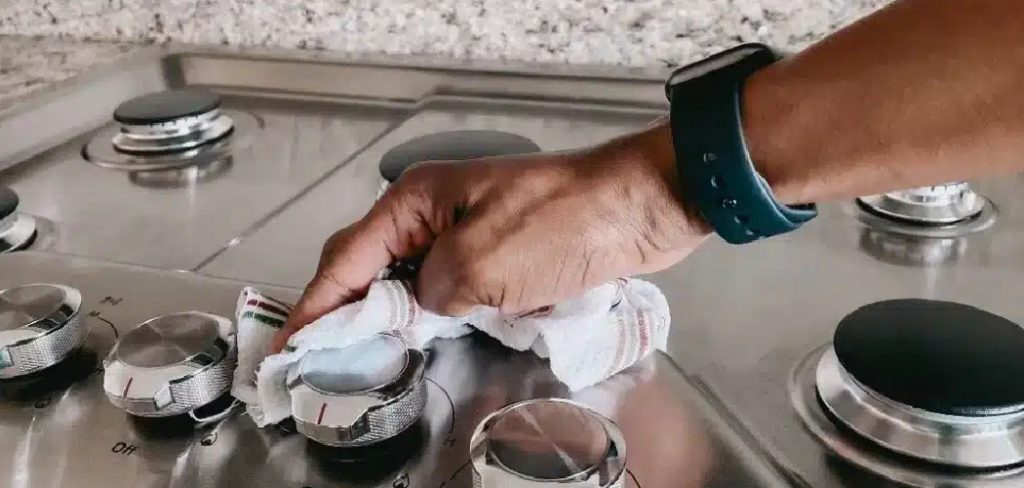
In this article on how to maintain a dishwasher, we will discuss the important steps and tips to keep your dishwasher in top shape.
What is a Dishwasher?
A dishwasher is a household appliance designed to efficiently clean and sanitize dishes, utensils, glassware, and cookware. It automates the labor-intensive task of handwashing by using a combination of water, detergent, and heat to remove food particles and bacteria. Most dishwashers operate through multiple cycles, including washing, rinsing, and drying, ensuring that items come out thoroughly cleaned and ready for use.
Modern dishwashers often feature customizable settings, energy efficiency, and advanced cleaning technologies, making them a convenient and essential addition to many homes.
Needed Materials
Dishwasher Detergent
High-quality detergent is designed specifically for dishwashers and provides the ideal combination of cleaning power, sanitization, and protection against mineral buildup. Avoid using regular hand dishwashing soap as it can create excess suds that can damage your dishwasher.
Vinegar
White vinegar is an excellent natural cleaner for appliances. It helps to remove hard water deposits, soap scum, and bacteria from your dishwasher.
Baking Soda
Baking soda is a gentle abrasive that effectively removes stubborn stains and odors while being safe for your appliance.
Soft Sponge or Cloth
Use a soft sponge or cloth when wiping down the interior of your dishwasher. Avoid using harsh scrubbers or steel wool, as they can scratch and damage the surface.
Toothbrush
A toothbrush is a useful tool for cleaning small areas, such as around the edges of the door and in tight spaces.
9 Step-by-step Guides on How to Maintain a Dishwasher
Step 1: Read the Manufacturer’s Manual
The first step in maintaining your dishwasher is to familiarize yourself with the manufacturer’s manual. This manual contains vital information specific to your dishwasher model, including proper usage instructions, recommended cleaning techniques, and safety precautions.
Following the manufacturer’s guidelines ensures that you are using your dishwasher correctly and helps prevent damage caused by improper handling. Additionally, the manual often includes troubleshooting tips and routine maintenance advice tailored to your appliance, making it an invaluable resource.
Step 2: Clean the Interiors and Exteriors
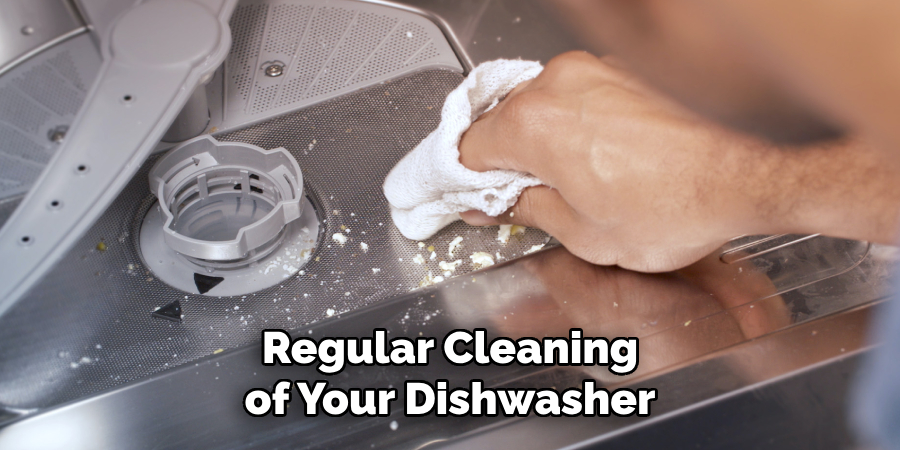
Regular cleaning of your dishwasher is crucial to prevent the build-up of grime, food particles, and bacteria. Start by wiping down the exterior with a damp cloth. For stainless steel appliances, use warm water and mild dish soap to avoid streaks or corrosion. Avoid using abrasive cleaners that can damage the finish.
Next, inspect the interior for any debris or residue from previous cycles. Remove any large food particles by hand, then run an empty cycle with one cup of white vinegar to eliminate odors and sanitize the interior.
Step 3: Check and Clean the Filter
The filter is responsible for catching bits of food and debris during the washing process. A clogged or dirty filter can cause your dishwasher to perform poorly and leave your dishes dirty.
Check your manufacturer’s manual for instructions on how to remove and clean the filter correctly. In most cases, you can simply rinse it with warm water and mild soap.
Step 4: Inspect Spray Arms
The spray arms are responsible for distributing water and detergent evenly throughout the dishwasher, ensuring that all items come out clean. Regularly check these arms for any obstructions or buildup of grime, as they can affect their performance.
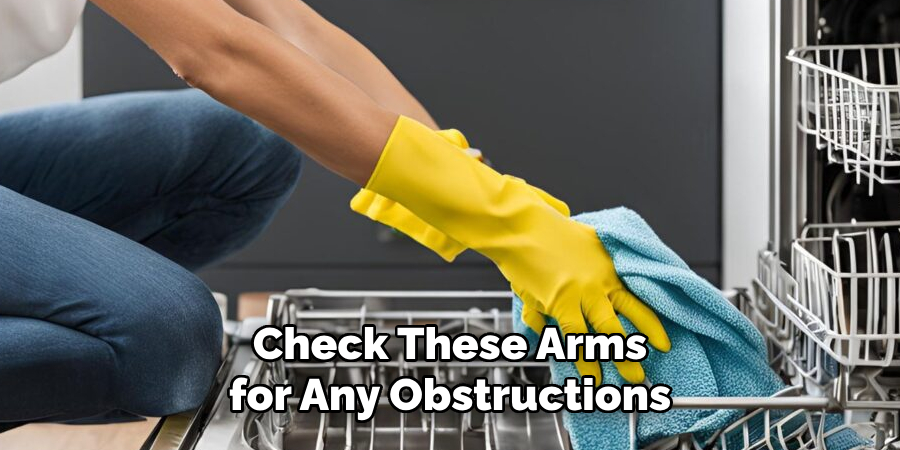
If you notice any blockages, use a toothbrush or toothpick to remove them gently. You should also ensure that the spray arms can rotate freely to ensure proper cleaning.
Step 5: Clean the Door Seal
The door seal, also known as a gasket, is the rubber lining that seals the dishwasher door shut during operation. This seal prevents water from leaking out and keeps your appliance airtight for effective cleaning.
Over time, food particles and debris can accumulate in the crevices of the door seal, leading to unpleasant odors and potential mold growth. Use a damp cloth or toothbrush to clean these areas regularly.
Step 6: Run an Empty Cycle with Baking Soda
Baking soda is excellent for removing stubborn stains and neutralizing odors. Once every few months, run an empty dishwasher cycle with a cup of baking soda to deep clean and deodorize your appliance.
Simply sprinkle the baking soda on the bottom of the dishwasher, then run a hot water cycle with no detergent or dishes.
Step 7: Check for Leaks
Inspect your dishwasher regularly for any signs of leaks, as even a small leak can lead to water damage and costly repairs. Start by examining the area around the base of the dishwasher after a cycle is complete. Look for puddles or damp spots that could indicate a problem.
Check the door seal for wear and tear, as a damaged or improperly seated seal is a common cause of leaks. Ensure the dishwasher is level, as an uneven appliance can cause water to escape. Tighten any loose connections in the water supply line, and inspect hoses for cracks or other signs of damage. Addressing leaks promptly will prevent further damage to your appliance and surrounding areas, ensuring smooth operation.
Step 8: Use Recommended Detergent
Using high-quality detergent designed specifically for dishwashers is crucial for maintaining efficiency and cleanliness. Avoid using too much or too little detergent, as this can affect cleaning performance and lead to residue build-up.
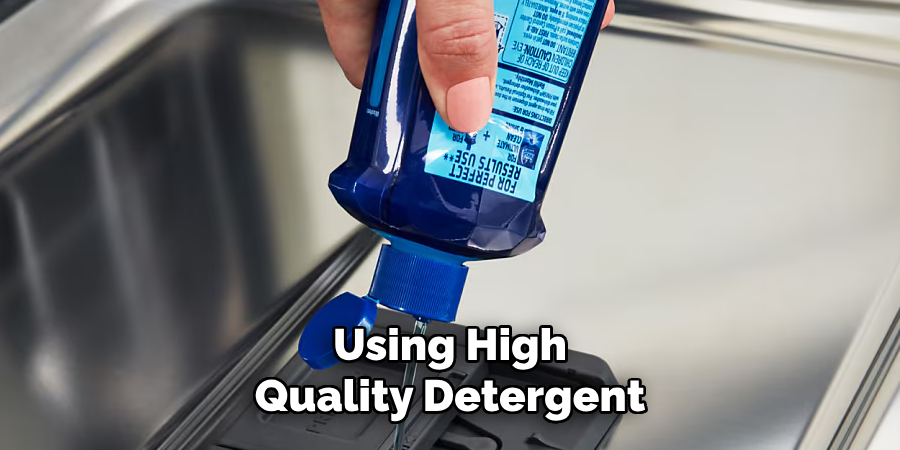
Additionally, consider using detergent booster if you have hard water. Hard water contains minerals that can cause buildup and affect the effectiveness of your dishwasher. Detergent boosters contain ingredients that soften the water, allowing for better cleaning results.
Step 9: Run a Monthly Rinse Cycle
To keep your dishwasher smelling fresh and performing at its best, it is recommended to run a monthly rinse cycle with a specialized cleaner or vinegar. This will help to remove any buildup and keep your dishwasher running smoothly. Follow the instructions on the cleaner bottle for best results.
Following these steps and regularly maintaining your dishwasher will not only keep it running efficiently but also extend its lifespan. Proper care and cleaning will ensure that your dishes come out sparkling clean every time, making meal prep and clean-up a breeze. Refer back to your manufacturer’s manual for more specific guidelines on maintenance, and don’t hesitate to contact a professional if you encounter any issues. Happy dishwashing!
Additional Tips
- Don’t overload your dishwasher, as this can hinder its performance and lead to dishes not getting cleaned properly.
- Be mindful of what you put in your dishwasher. Not all items are dishwasher safe and can cause damage or create a mess.
- Regularly check the spray arms and clean them if necessary to ensure proper water distribution.
- Use rinse aid to prevent spots and streaks on your dishes, especially if you have hard water.
- Consider using eco-friendly dishwashing pods or tablets for a more environmentally-friendly option. These usually come with built-in rinse aid and detergent booster for convenience.
Overall, maintaining your dishwasher doesn’t have to be a daunting task. With these simple steps, you can keep your appliance running smoothly and ensure clean dishes every time. Remember to refer back to your manufacturer’s manual for specific guidelines and always practice safety when working on your dishwasher. Happy cleaning!
Frequently Asked Questions
Q: How Often Should I Clean My Dishwasher?
A: It is recommended to clean your dishwasher once a month and perform routine maintenance every 3-6 months to keep it running smoothly. It is also important to clean it more frequently if you notice any odors or performance issues.
Q: Can I Use Regular Dish Soap in My Dishwasher?
A: No, regular dish soap should not be used in a dishwasher. It produces too many suds and can damage your appliance. Always use detergent specifically designed for dishwashers.
Q: Do I Need to Rinse My Dishes Before Putting Them in the Dishwasher?
A: While some food particles are inevitable, it is not necessary to fully rinse your dishes before loading them into the dishwasher. Scrape off excess food and let the dishwasher do the rest of the work. However, heavily soiled dishes may require pre-rinsing.
Q: Is it Normal for My Dishwasher to Make Noise?
A: Some level of noise is expected during a wash cycle, but excessive or unusual noises could indicate a problem. If you notice any loud or unfamiliar sounds coming from your dishwasher, it’s best to get it checked by a professional.
Q: How Can I Prevent Residue Buildup in My Dishwasher?
A: Regularly cleaning and maintaining your dishwasher will help prevent residue buildup. Running an empty cycle with baking soda and using a rinse aid can also help prevent residue from forming. If you notice residue, try cleaning the spray arms and checking for any clogs in the drain or filter.
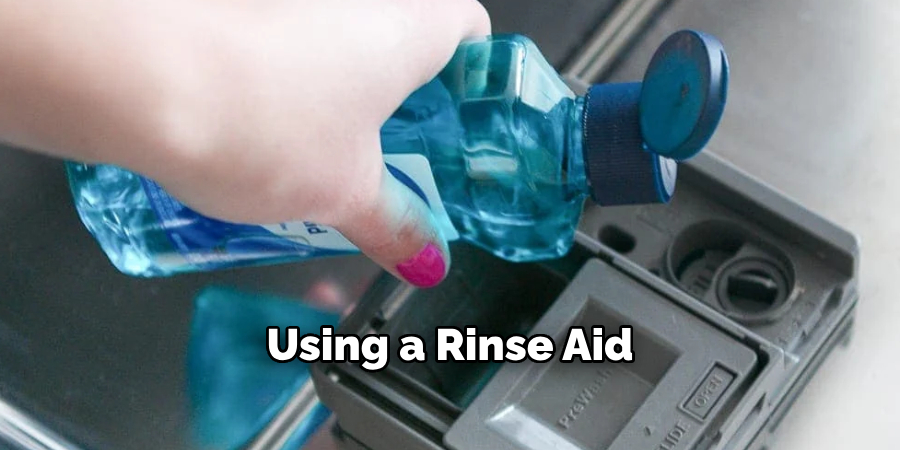
Conclusion
By following these simple steps on how to maintain a dishwasher and regularly maintaining your dishwasher, you can prolong its lifespan, prevent costly repairs, and ensure sparkling clean dishes every time. Remember to consult your manufacturer’s manual and use high-quality products for best results.
Your dishwasher works hard to make your life easier, so it’s important to give it the care and attention it deserves. Happy dishwashing!
Professional Focus
Angela Ervin, a former interior designer turned blogger, specializes in kitchen design and renovations. Through her website, she blends her passion for cooking with design expertise, sharing practical and creative ideas. Known for balancing functionality and beauty, Angela’s insightful content has made her a trusted voice in home design and lifestyle.
About the Author
Angela Ervin, an experienced interior designer and blogger, combines her passion for kitchen renovations with storytelling. Living in Petersburg with her family, she enjoys cooking and testing her projects firsthand. Known for her humor and relatable style, Angela shares creative, functional design insights through her content, making her a trusted voice in home design.
Education History
University: Virginia Commonwealth University
Degree: Bachelor of Fine Arts (BFA) in Interior Design
- Angela’s education at VCU focused on mastering core interior design principles, including spatial planning, color theory, materials selection, and sustainable design practices.
- She gained hands-on experience through studio projects and collaborative design exercises, which honed her ability to create functional and aesthetically pleasing environments.
- Her coursework also emphasized problem-solving and practical applications of design, preparing her for real-world projects like her self-directed kitchen renovations.
- The program’s strong foundation in both technical skills and creative expression shaped Angela’s ability to seamlessly integrate form and function in her work.
